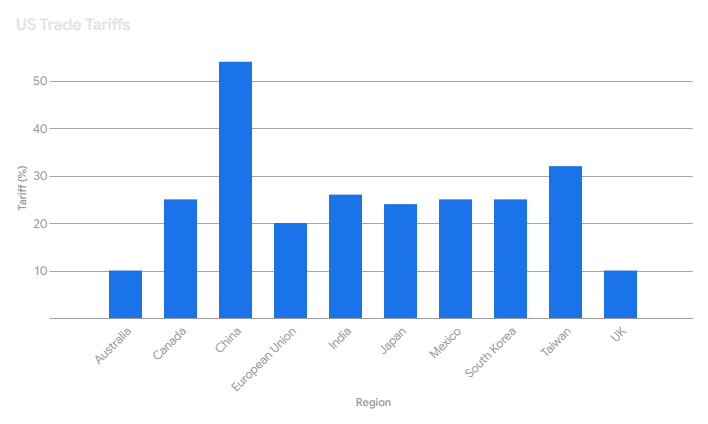US trade tariffs: Freelancers must adjust rates before they face financial squeeze
The recent imposition of US trade tariffs has generated turbulence across global markets, leaving businesses and individuals alike anticipating considerable cost increases. For freelancers throughout the UK, and indeed worldwide, it’s now essential to get a better understanding of the tariff situation and to consider appropriate adjustments to their rates and costs.
Industries experiencing the sharpest tariff increases
The manufacturing sector is set to feel an acute impact, with businesses reliant on imported materials facing substantial price rises. The construction industry also anticipates a surge in material costs. Other industries impacted by the US trade tariffs include cars, steel and aluminium, food and beverage and chemicals.
Retail-based and e-commerce freelancers and small business owners, especially those involved in product sourcing, must be prepared for swift and significant changes, as these sectors are highly exposed to the new tariffs.
Nations most affected by US trade tariffs
Countries with strong trade links to the US will experience the most pronounced economic strain. Nations heavily dependent on imported goods will see immediate price hikes, creating knock-on effects that will inevitably affect freelancers operating within those economies.

Tariff rates source: The Guardian
Regional freelancer rate adjustments across the UK
“One potential impact of the tariffs is that the value of the dollar could rise against the pound, making anything we import more expensive,” says Sarah Coles, Head of Personal Finance at Hargraves Lansdown.
She says this includes everything from food to the components for manufacturing. However, Coles says, in the short term, this could be offset to some extent by countries sending goods to the UK instead of the US, which could temporarily bring some prices down.
“As with everything else associated with these tariffs, there’s huge uncertainty, and we will need to keep a close eye on developments in the coming weeks,” she says.
Within the UK, the effects will vary regionally. In London and the Southeast, where living costs are already high, freelancers will need to consider substantial yet perhaps gradual rate increases to balance out the rising costs of housing and transport.
While living costs are generally lower in Northern England and Scotland, freelancers there will still feel the impact of local inflation and industry-specific pressures.
The increased cost of imported materials used in their work, along with potential rises in transportation, utilities, and professional supplies, must be factored into their pricing. It is also important to take into account the effect these increases will have on their client’s budgets.
Digital and creative sectors: least affected by US tariffs?
Freelancers in digital services, such as software development and web design, may experience less direct impact from the tariffs. However, the indirect effect of higher living costs on client budgets remains a concern.
Creative industries, including writing and graphic design, may see relative stability, but those using imported equipment or software should be aware of potential price increases. Essential services, such as healthcare consultancy, are likely to maintain consistent demand.
Preparing for inflation (again)
Coles says there’s a risk that inflation is imported from the US and around the world, which would mean the Bank of England keeps interest rates higher for longer, which would mean more expensive mortgages.
But she offers some hope. “However, right now, the market doesn’t think this will be the Bank’s biggest worry. It’s assuming that all these tariffs hit global trade, putting the Bank of England under pressure to cut rates to support growth, so it’s pricing in more cuts.”
Those in the market for a new mortgage must keep on top of the news. Coless suggests, “The uncertainty means that if you have a remortgage looming, it’s well worth shopping around for a deal as early as possible. If rates rise between now and when you need to remortgage, you’ll have locked in a cheaper deal, and if they fall, you can track down something more competitive.”
US trade tariffs: what actions should freelancers take?
To manage the turbulent economic climate, UK freelancers should:
- Stay informed: Closely monitor industry-specific impacts
- Adjust rates prudently: Factor in increased living and material costs
- Consider client budgets: Be mindful of client financial constraints; offer new packages
- Diversify income: Explore additional revenue streams to reduce risk
- Review contracts: Ensure contracts accurately reflect current economic conditions and do not include non-compete or no-poaching clauses.
While freelancers and clients alike will be impacted by the new trade tariffs, many freelancers may have to consider raising their rates by a minimum of 10%. This is especially the case if they have not done so in the past 18 months when everyday item costs and interest rates on mortgages have gone up considerably.


